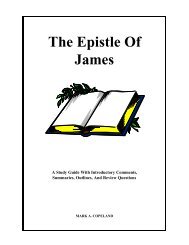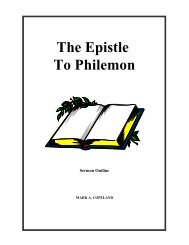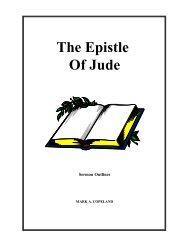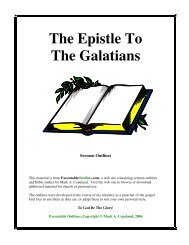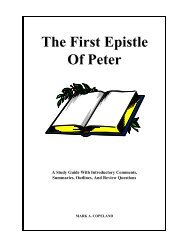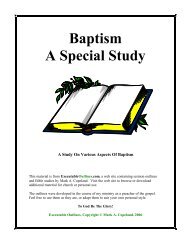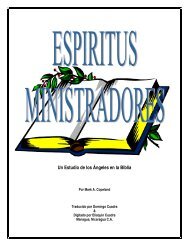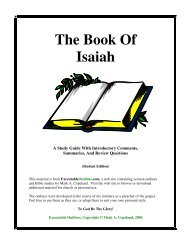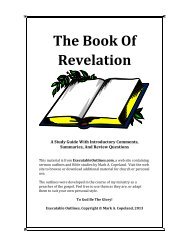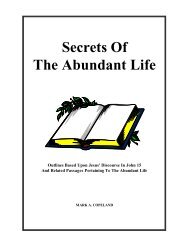The Epistle To The Hebrews - Executable Outlines
The Epistle To The Hebrews - Executable Outlines
The Epistle To The Hebrews - Executable Outlines
You also want an ePaper? Increase the reach of your titles
YUMPU automatically turns print PDFs into web optimized ePapers that Google loves.
Mark A. Copeland<br />
3. What about “corrective” discipline today?<br />
a. If God would use Providence to encourage Israel to repent before it was too late...<br />
1) Would not the same God use Providence to chastise His erring children today?<br />
2) Does He love us any less?<br />
b. I know of no scriptural reason why God would not use Providence to bring about<br />
events in our lives which serve to:<br />
1) Wake us up<br />
2) Cause us to reflect on our lives and our relationship to God<br />
3) Encourage us to repent and turn back to Him if we are straying<br />
c. <strong>The</strong>re are several passages which suggest that God might bring some form of<br />
“corrective” discipline if we do not heed His “instructive” discipline...<br />
1) Some of the Corinthians had already begun to experience God’s chastisement,<br />
which they could have avoided if they had “judged” themselves (by heeding His<br />
word) - 1 Co 11:30-32<br />
2) Jesus spoke of some way in which He would punish some at Thyatira that would be<br />
evident to all - cf. Re 2:20-23<br />
-- I therefore have no problem with the idea that God may choose to employ corrective<br />
discipline in the form of national and even personal affliction<br />
[My understanding of a loving God chastening His children is tempered by my understanding of “why”<br />
He does this...]<br />
III. THE “WHY” OF THE LORD’S CHASTENING<br />
A. CERTAINLY NOT BECAUSE HE DELIGHTS IN DOING SO...<br />
1. God found it necessary to bring judgment upon Israel - Lam 1:3-5<br />
2. It was not something He wanted to do - Lam 3:31-33<br />
B. WHEN NECESSARY, IT IS FOR OUR GOOD...<br />
1. <strong>To</strong> correct us - He 12:9<br />
a. Our human fathers do so, and we respect them for it<br />
b. Should we not expect the same from the “Father of spirits”, and submit to it?<br />
2. That we may be partakers of His Holiness - He 12:10<br />
a. Our human fathers do it for what seems best to them<br />
b. Our heavenly Father does it for a reason that far excels any earthly purpose!<br />
3. That we may yield the peaceable fruit of righteousness - He 12:11<br />
a. In the short term, the experience is unpleasant<br />
b. But in the long term, we benefit by such “training”!<br />
CONCLUSION<br />
1. Whether “corrective” or “instructive” chastisement, it is always for our good...!<br />
a. It may be grievous - He 12:11a<br />
b. But it will produce “the peaceable fruit of righteousness to those who have been trained by it”<br />
- He 12:11b<br />
2. “Corrective” chastisement can mostly be avoided...<br />
a. By correcting ourselves - cf. 1 Co 11:31-32<br />
b. Which we can do by taking heed to God’s Word - cf. Jn 15:2-3<br />
Sermons From <strong>Hebrews</strong> 100



